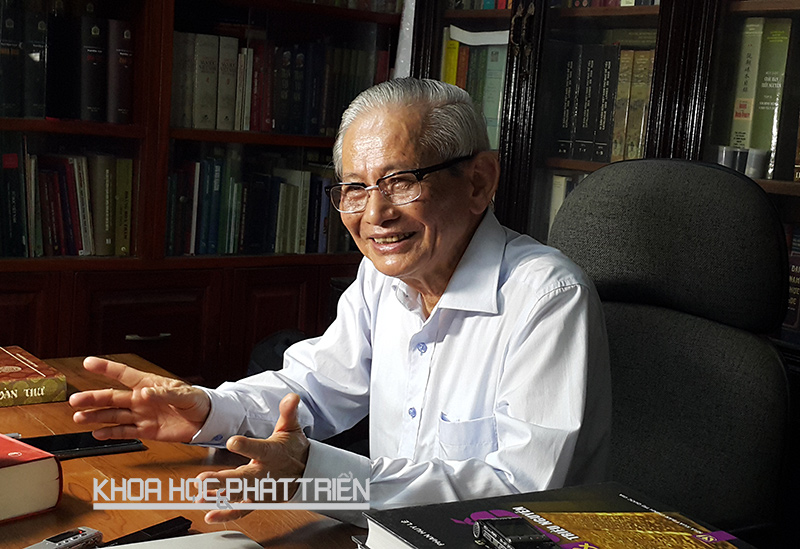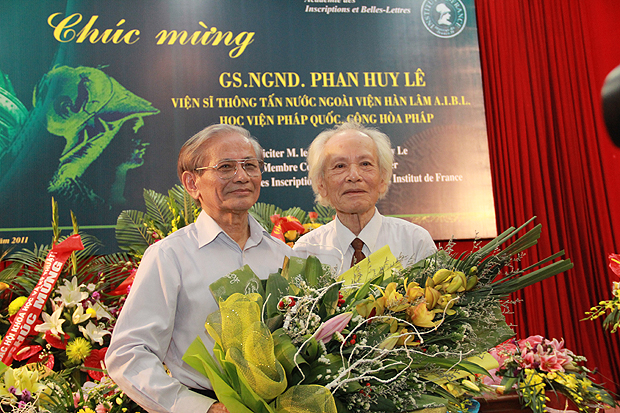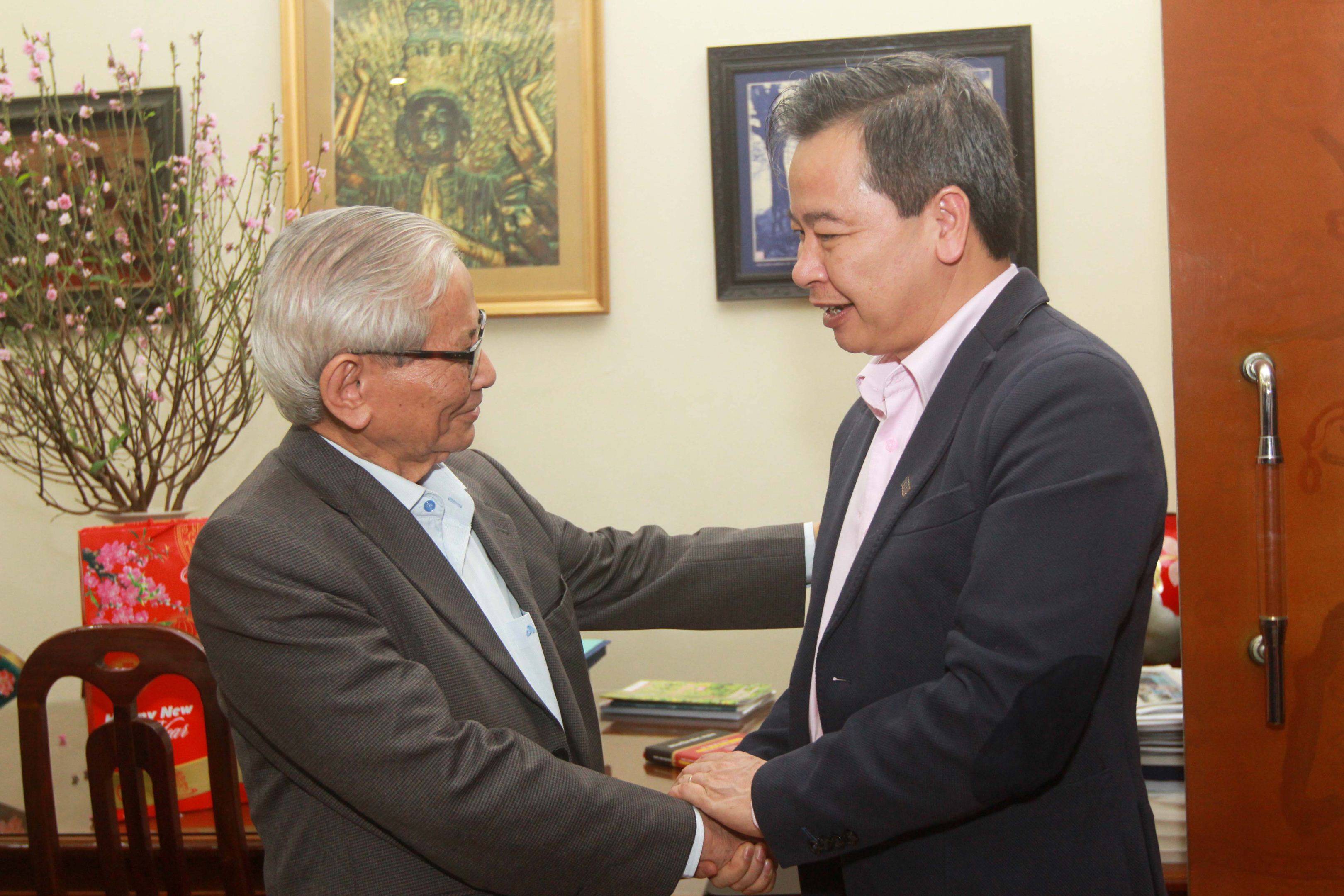
After a week of emergency hospitalization due to heart disease, despite the doctors' best efforts to save him, Professor Phan Huy Le passed away. He died at 1:36 PM today (June 23).
Along with Professor Ha Van Tan, Professor Tran Quoc Vuong, and Professor Dinh Xuan Lam, Professor Phan Huy Le formed the "four pillars" of contemporary Vietnamese historiography. According to the late Professor Tran Quoc Vuong's explanation, the concept of the "four pillars" likely originated in late 1960, when all four were renowned for their academic excellence.
Professor Phan Huy Lê was born in 1934 in Thu Hoạch village, Thạch Châu commune, Thạch Hà district (now Lộc Hà district), Hà Tĩnh province. He was the 14th-generation descendant of the Phan Huy family, renowned for its scholarly achievements and prominent figures such as Phan Huy Cẩn, Phan Huy Ích, Phan Huy Thực, Phan Huy Vịnh, and Phan Huy Chú…

Professor Phan Huy Le (1934-2018). Photo: Science and Development.
His father, Phan Huy Tung, was a high-ranking official in the Hue imperial court. Professor Phan Huy Le is considered one of Vietnam's leading experts in historical research. However, few people know that he came to the field of history out of… necessity.
“After graduating from high school, I went to Thanh Hoa with a few friends to attend university. On the way, due to continuous bombing, we arrived five days late for enrollment. Professor Tran Van Giau – the school's principal at the time – forced the whole group to study literature and history, while my wish was to study mathematics and physics. I was reluctantly forced to study history, but the more I learned, the more interesting I found it,” he recounted.
After graduating from university, he was retained as an assistant intern at the Department of History, Hanoi University (now Vietnam National University, Hanoi), under the guidance of Professor Dao Duy Anh.
Just two years later, he was appointed Head of the Department of Ancient and Medieval Vietnamese History and continuously held this position for decades. In addition to teaching in Vietnam, he also taught at many universities around the world, such as the University of Paris (France), the University of Amsterdam (Netherlands), etc.

Professor Phan Huy Le and Professor Dinh Xuan Lam
From 1988 to the present, he has continuously served as the Chairman of the Vietnam Historical Science Association. In addition, he is a member of many National Councils such as the National Council for the Compilation of the Encyclopedia, the National Council for Science and Technology Policy, the Central Theoretical Council, the Council for Science and Training of Hanoi National University, the State Council for Academic Titles, the National Council for Cultural Heritage, etc.
He is the author of hundreds of valuable research works on history, including notable works such as "Land Ownership System and Agricultural Economy during the Early Le Dynasty," "History of the Vietnamese Feudal System," "Lam Son Uprising," "Tay Son Peasant Movement," "History and Culture of Vietnam," "Traditional Values and People of Vietnam Today," "Tracing Our Roots," "History of Thang Long - Hanoi," etc.
In 2000, he was awarded the State Prize for Science and Technology for his work "Returning to the Roots".
In 2016, his work "History and Culture of Vietnam - A Partial Approach" was awarded the prestigious Ho Chi Minh Prize. This was the only work in the field of history to receive the award in that round.
This work is a collection of numerous articles and research papers by Professor Phan Huy Le, both domestic and international, compiled over a period of 10 years, starting in 1998. The most distinctive aspect of this work is its multi-faceted and comprehensive approach, encompassing both spatial and temporal dimensions within Vietnamese history.

Professor Phan Huy Le and Professor Pham Quang Minh
Accordingly, ancient Vietnamese history includes not only the history of the Van Lang and Au Lac states but also the Champa state and Sa Huynh culture in central Vietnam, and the Oc Eo culture and Funan state in southern Vietnam. Since its founding, Vietnam has been a multi-ethnic nation.
His research has become a teaching material at many universities nationwide, providing scientific evidence to support the assertion of national territorial sovereignty, especially over the Central and Southern regions of Vietnam.
Even in his 80s, he remains passionately dedicated to researching historical issues, especially ancient history, which has been largely forgotten or misinterpreted.
He argued that King Thục Phán – An Dương Vương originated from an ancient Tay leader, the king of the Nam Cương kingdom with its capital in what is now Cao Bằng province. Therefore, the establishment of Âu Lạc was not the result of an external conquest war, but rather the unification of population and land within the Vietnamese ethnic groups, primarily between Tây Âu and Lạc Việt.
He also asserted that although Trieu Da's Nam Viet state claimed to have restored independence to some ancient Vietnamese communities, in reality, the Trieu dynasty invaded Au Lac, ushering in a 10-century period of Northern domination over the Vietnamese people.
Having become a prominent figure in the field of historical research, he believes that the people who influenced him the most were Professor Tran Van Giau and Professor Dao Duy Anh.
"They are all my respected teachers. They instilled in me a passion for history and helped me achieve the success I have today," he shared.
According to vtv.vn
Author:Minh Duc